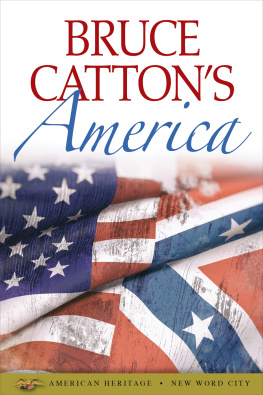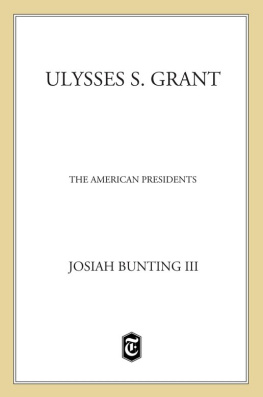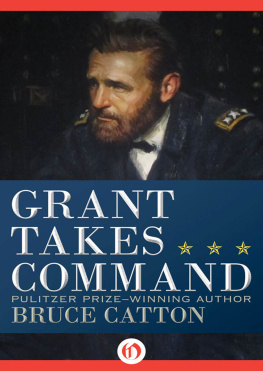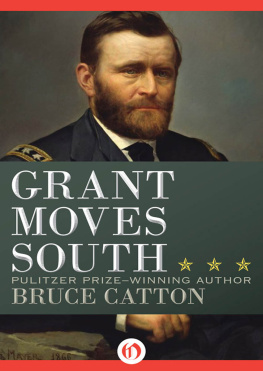Publishers Note
In the spring of 1950 we were privileged to publish Captain Sam Grant, the first volume of a three-volume biography of U. S. Grant written by the brilliant historian and biographer Lloyd Lewis. Tragically, the author died before publication and the acclaim which was accorded the book.
Mr. Lewis, however, in the course of his extensive research, amassed many notes. Therefore, with Kathryn Lewis, the authors widow, we spent years searching for a writer and historian well qualified to carry on the project. Finally, Mrs. Lewis recommended Bruce Catton, whom she had met in Chicago. She told us he was very interested in Grant and would like to continue the biography. Of course, the choice was ideal, as no living writer re-creates this great period in our history more expertly than Mr. Catton.
Thereafter Mr. Catton spent many months analyzing the Lewis notes, conducting additional research, and writing the narrative of the next volume. Now we are proud to publish Grant Moves South, Volume II of this important work.
1960
CHAPTER ONE
Tomorrow I Move South
The Governor of Illinois remembered that he was plain, very plain, and men said that he usually went about camp in a short blue coat and an old slouch hat, wearing nothing that indicated his rank, nothing indeed that even proved he was in the Army. The men of his regiment spoke of him as the quiet man, and afterward they admitted that they never exactly understood him. He was not in the least impressive, but somehow he took charge, subduing the disobedient without, apparently, using anything more than a hard look and a soft word. (It was told that one time he personally jumped a drunken private who had overawed the guard, knocking the man down and then sitting on him while applying bonds and a gag; but this, if not exactly out of character, was at least out of the ordinary. For the most part men seemed to obey him simply because he expected them to do so.) An admiring chaplain, looking back at the end of the war, said that no stranger, seeing this man in a crowd, would ever be moved to ask who he was.
There was nothing about Ulysses S. Grant that struck the eye; and this puzzled people, after it was all over, because it seemed reasonable that greatness, somewhere along the line, should look like greatness. Grant could never look like anything, and he could never make the things he did look very special; and afterward men could remember nothing more than the fact that when he came around things seemed to happen. The most they could say, usually, was that U. S. Grant had a good deal of common sense.
His experience in the early summer of 1861 with the 21st Illinois Volunteer Infantry was quite typical.
The 21st Illinois might have been set up on purpose to test a colonel. It had been formed, as the Seventh District Regiment, in the
The Lieutenant Colonel, conscientious John W. S. Alexander, was doing his best. (As a man, his best was good: he would die, a little more than two years later, under the Confederate guns at Chickamauga, a place that no man in Illinois had so much as heard of, in this early summer of 1861.) On June 16, which was the same day Grant wandered in on the regimental Adjutant and remarked that he guessed hed take command, Alexander issued a regimental order demanding stricter discipline, following it with other orders setting up a very tight routine. The men were to be turned out each morning at five oclock, and at 7:30breakfast and ordinary camp chores having been disposed ofthe days work would begin, with three-and-one-half unbroken hours of drill by squad, by company and by battalion. At 2:30 in the afternoon the same would begin all over again; two hours of company drill and an hour of battalion drill, with regimental dress parade scheduled for 5:30, retreat at sundown, and tattoo sounded at 9 P.M. day for these farmboys who were so unused to restraint; furthermore, it seems to have occurred to no one (except to the privates themselves, possibly) that it gets very warm on the Illinois prairie at midday in summer and that five or six hours of pack drill on the infield of a state fairgrounds may be a little more than any human being can take.
Officially, Grant took command of the 21st Illinois on June 16, at the state fairgrounds at Springfield, but his first formal order to the regiment, announcing his assumption of command, was issued on June 18. In this order Grant briefly declared himself:
In accepting this command, your Commander will require the cooperation of all the commissioned and noncommissioned officers in instructing the command and in maintaining discipline, and hopes to receive also the hearty support of every enlisted man.
The emphasis, then and thereafter, was on the officers, who had much to learn and who now had a colonel who was prepared to teach them. Many years afterward, writing his Memoirs, Grant confessed: I found it very hard work for a few days to bring all the men into anything like subordination; but the great majority favored discipline, and by the application of a little regular army punishment all were reduced to as good discipline as one could ask.
Actually, it was not quite that simple. Grant had the Regular Army way of doing things at his finger tips, but he was always aware that the volunteer soldier was not the Regular, and he never treated Volunteers as regular recruits were commonly treated. He would impose discipline, to be sure, but it would not be the discipline of the Prussian guards, and he would always act as if these raw soldiers were men who could be reasoned with, men with a sense of responsibility that would respond if anyone bothered to appeal to it. (Toward the end of the war fellow officers noticed that one of Grants favorite remarks was that the common soldiers are as smart as town folks.) His first major order, dated June 19, is worth a look. It is typically Grant, from its refusal to strike an attitude down to its carelessness about capitalization and spelling, and it reads as follows:
Hereafter no passes to soldiers to be out of Camp after sundown will be valid unless approved by the Commanding Officer of the Regt.
From Reveille until Retreat no passes will be required. In extending this privilege to the men of this command the Col Commanding hopes that this leniency will not be so abused as to make it necessary to retract it. All men when out of Camp should reflect that they are Gentlemenin camp soldiers; and the Commanding Officer hopes that all of his command will sustain these two characters with fidelity.


